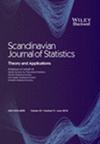缺失数据的基于集成学习的稳健准随机化估计
IF 1
4区 数学
Q3 STATISTICS & PROBABILITY
引用次数: 0
摘要
缺失数据分析需要对结果模型或响应概率模型进行假设,以调整由于无响应而产生的潜在偏差。如果至少有一个模型被正确指定,则双鲁棒估计量是一致的。多重鲁棒(MR)估计器通过允许结果和/或响应概率模型的多个模型来扩展DR估计器,如果多个模型中至少有一个被正确指定,则它们是一致的。我们提出了一种鲁棒的基于准随机化的模型方法,比现有的DR和MR估计器提供更多的保护,防止模型错误规范,其中任何多个半参数,非参数或机器学习模型都可以用于结果变量。提出的估计器通过使用子抽样Rao-Blackwell方法实现无偏性,给定细胞均匀响应,而不管结果的任何工作模型。提出了一种不使用重复折刀法和自举法的无偏方差估计公式。仿真研究表明,该方法优于现有的多重鲁棒估计方法。本文章由计算机程序翻译,如有差异,请以英文原文为准。
Robust quasi‐randomization‐based estimation with ensemble learning for missing data
Missing data analysis requires assumptions about an outcome model or a response probability model to adjust for potential bias due to nonresponse. Doubly robust (DR) estimators are consistent if at least one of the models is correctly specified. Multiply robust (MR) estimators extend DR estimators by allowing for multiple models for both the outcome and/or response probability models and are consistent if at least one of the multiple models is correctly specified. We propose a robust quasi‐randomization‐based model approach to bring more protection against model misspecification than the existing DR and MR estimators, where any multiple semiparametric, nonparametric or machine learning models can be used for the outcome variable. The proposed estimator achieves unbiasedness by using a subsampling Rao–Blackwell method, given cell‐homogenous response, regardless of any working models for the outcome. An unbiased variance estimation formula is proposed, which does not use any replicate jackknife or bootstrap methods. A simulation study shows that our proposed method outperforms the existing multiply robust estimators.
求助全文
通过发布文献求助,成功后即可免费获取论文全文。
去求助
来源期刊

Scandinavian Journal of Statistics
数学-统计学与概率论
CiteScore
1.80
自引率
0.00%
发文量
61
审稿时长
6-12 weeks
期刊介绍:
The Scandinavian Journal of Statistics is internationally recognised as one of the leading statistical journals in the world. It was founded in 1974 by four Scandinavian statistical societies. Today more than eighty per cent of the manuscripts are submitted from outside Scandinavia.
It is an international journal devoted to reporting significant and innovative original contributions to statistical methodology, both theory and applications.
The journal specializes in statistical modelling showing particular appreciation of the underlying substantive research problems.
The emergence of specialized methods for analysing longitudinal and spatial data is just one example of an area of important methodological development in which the Scandinavian Journal of Statistics has a particular niche.
 求助内容:
求助内容: 应助结果提醒方式:
应助结果提醒方式:


